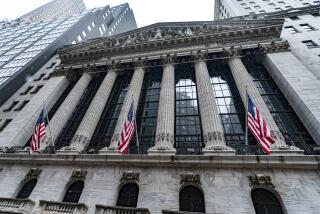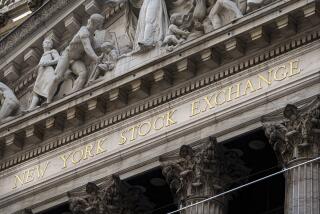Renewed fears spark sell-off
- Share via
NEW YORK — The private equity boom that has helped drive the 4 1/2 -year-old bull market in stocks is facing severe pressure as investors chastened by the sub-prime mortgage debacle balk at financing risky deals.
Junk bond yields soared for a second day Tuesday to a nearly four-year high, reflecting the uneasiness of the market in which buyout firms are trying to sell nearly a quarter-trillion dollars of high-yield, high-risk securities to fund several big deals, such as the planned acquisition of Chrysler Group by Cerberus Capital Management.
The financing for a number of buyouts has been delayed or canceled in the last few weeks as investors have pulled back from buying the debt being offered. The $12 billion of new debt to be issued for the Chrysler deal also reportedly is facing resistance among investors. In other buyouts, companies have been forced to pay higher interest rates and offer other concessions to lure investors.
“The feeling in the market is, ‘Why buy a deal today when next week I can buy it cheaper?’ ” said Stephen Carter, a high-yield bond analyst at Thomson Financial in New York.
The newly cautious dynamic represents an abrupt turnaround from last year and early this year, when what economists described as an excess supply of cash, much of it from overseas, made it easy for practically any company to borrow money at historically low interest rates.
In some cases, the money was lent without many of the safeguards that had historically protected investors against defaults.
Analysts attribute the change to growing losses in the value of securities backed by sub-prime mortgages amid rising defaults by home buyers with poor credit. In part, these analysts say, hedge funds and other institutions that invested heavily in such paper have been constrained by their losses from investing in high-risk corporate debt. More broadly, the sub-prime debacle has prompted investors in general to reevaluate their appetite for risky investments.
The retrenchment has sparked a debate about whether a “credit crunch” has taken hold that could damage the economy.
In his monthly investment newsletter, Bill Gross, the widely followed bond-fund manager at Pacific Investment Management Co. in Newport Beach, said “the sudden liquidity crisis” in the junk bond market showed there was “a chain that links all markets and ultimately their prices and yields to the fate of the U.S. economy.”
The sudden chill is bad news for Wall Street’s investment banks, which have reaped enormous profits from corporate takeovers. And it’s bad news for individual investors who own shares in junk bond mutual funds, the value of which has tumbled as their yields have surged.
The development is also bad for stock investors because a sustained falloff in buyouts would remove a major source of demand for stocks.
“Investors should be coming to the realization that many of these deals may not get done or at least not on the terms initially envisioned,” said Kingman Penniman, president of KDP Investment Advisors Inc., a junk bond research firm in Montpelier, Vt. Such fears drove the Dow Jones industrial average down more than 226 points Tuesday.
The upheaval has played out most clearly in the junk bond market. Only five high-yield offerings, raising a scant $2.1 billion, have been done this month, according to Thomson. That represents a sharp drop from 39 offerings that raised $22.5 billion in all of June and 41 deals for $24.1 billion in all of May.
The average yield on an index of 100 junk bonds tracked by KDP Investment Advisors jumped to 8.36% on Tuesday, up from 8.24% on Monday and its highest level since September 2003.
“Six weeks ago, the high-yield debt market was humming the Campbell’s soup theme and now it’s begging for a truckload of Rolaids,” Gross wrote in his commentary.
Wall Street banks had planned to issue more than $230 billion in leveraged loans and an additional $100 billion in high-yield bonds in the next six to nine months, Penniman said.
Leveraged loans are issued by investment banks, which sell the debt in pieces to large investors.
The junk bond market had been on pace for a record-setting year, he said. About $96 billion in high-yield bonds has been issued this year.
The record was $137 billion in 2004, followed by $131 billion last year.
--
More to Read
Inside the business of entertainment
The Wide Shot brings you news, analysis and insights on everything from streaming wars to production — and what it all means for the future.
You may occasionally receive promotional content from the Los Angeles Times.










